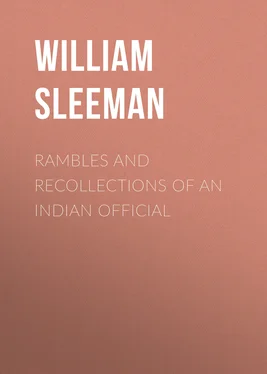William Sleeman - Rambles and Recollections of an Indian Official
Здесь есть возможность читать онлайн «William Sleeman - Rambles and Recollections of an Indian Official» — ознакомительный отрывок электронной книги совершенно бесплатно, а после прочтения отрывка купить полную версию. В некоторых случаях можно слушать аудио, скачать через торрент в формате fb2 и присутствует краткое содержание. Жанр: Путешествия и география, История, foreign_edu, foreign_antique, foreign_prose, на английском языке. Описание произведения, (предисловие) а так же отзывы посетителей доступны на портале библиотеки ЛибКат.
- Название:Rambles and Recollections of an Indian Official
- Автор:
- Жанр:
- Год:неизвестен
- ISBN:нет данных
- Рейтинг книги:4 / 5. Голосов: 1
-
Избранное:Добавить в избранное
- Отзывы:
-
Ваша оценка:
- 80
- 1
- 2
- 3
- 4
- 5
Rambles and Recollections of an Indian Official: краткое содержание, описание и аннотация
Предлагаем к чтению аннотацию, описание, краткое содержание или предисловие (зависит от того, что написал сам автор книги «Rambles and Recollections of an Indian Official»). Если вы не нашли необходимую информацию о книге — напишите в комментариях, мы постараемся отыскать её.
Rambles and Recollections of an Indian Official — читать онлайн ознакомительный отрывок
Ниже представлен текст книги, разбитый по страницам. Система сохранения места последней прочитанной страницы, позволяет с удобством читать онлайн бесплатно книгу «Rambles and Recollections of an Indian Official», без необходимости каждый раз заново искать на чём Вы остановились. Поставьте закладку, и сможете в любой момент перейти на страницу, на которой закончили чтение.
Интервал:
Закладка:
Of criminal law no system was ever either regularly established or administered in any state in India, by any Government to which we have succeeded; and the people always consider the existing Government free to adopt that which may seem best calculated to effect the one great object, which criminal law has everywhere in view— the security of life, property, and character, and the enjoyment of all their advantages . The actions by which these are affected and endangered, the evidence by which such actions require to be proved, and the penalties with which they require to be visited, in order to prevent their recurrence, are, or ought to be, so much the same in every society, that the people never think us bound to search for what Muhammad and his companions thought in the wilds of Arabia, or the Sanskrit poets sang about them in courts and cloisters. They would be just as well pleased everywhere to find us searching for these things in the writings of Confucius and Zoroaster, as in those of Muhammad and Manu: and much more so, to see us consulting our own common-sense, and forming a penal code of our own, suitable to the wants of such a mixed community. 138 138 In the author's time the courts of the East India Company still followed the Muhammadan criminal law, as modified by the Regulations. The Indian Penal Code of 1869 placed the substantive criminal law on a thoroughly scientific basis. This code was framed with such masterly skill that to this day it has needed little material amendment. The first Criminal Procedure Code, passed in 1861, has been twice recast. The law of evidence was codified by Sir James FitzJames Stephen in the Indian Evidence Act of 1870.
The fiscal laws which define the rights and duties of the landed interests and the agricultural classes in relation to each other and to the ruling powers were also everywhere exceedingly simple and well understood by the people. What in England is now a mere fiction of law is still in India an essential principle. All lands are held directly or indirectly of the sovereign: to this rule there is no exception. 139 139 This proposition, in the editor's opinion, truly states the theory of land tenures in India, and it was a generally accurate statement of actual fact in the author's time. Since then the long continuance of settled government, by fostering the growth of private rights, has tended to obscure the idea of state ownership. The modern revenue codes, instead of postulating the ownership of the state, enact that the claims of the state—that is to say, the land- revenue—are the first charge on the land and its produce. The Malabar coast offers an exception to the general Hindu role of state ownership of land. The Nairs, Coorgs, and Tulus enjoyed full proprietary rights (Dubois, Hindu Manners, &c ., 3rd edition (1906), p. 57).
The reigning sovereign is essentially the proprietor of the whole of the lands in every part of India, where he has not voluntarily alienated them; and he holds these lands for the payment of those public establishments which are maintained for the public good, and are supported by the rents of the lands either directly under assignment, or indirectly through the sovereign proprietor. When a Muhammadan or Hindoo sovereign assigned lands rent-free in perpetuity , it was always understood, both by the donor and receiver, to be with the small reservation of a right in his successor to resume them for the public good, if he should think fit. 140 140 Amīr Khān, the Nawāb of Tonk, assigned to his physician, who had cured him of an intermittent fever, lands yielding one thousand rupees a year, in rent-free tenure, and gave him a deed signed by himself and his heir-apparent, declaring expressly that it should descend to him and his heir for ever. He died lately, and his son and successor, who had signed the deed, resumed the estate without ceremony. On being remonstrated with, he said that 'his father, while living, was, of course, master, and could make him sign what he pleased, and give land rent-free to whom he pleased; but his successor must now be considered the best judge whether they could be spared or not; that if lands were to be alienated in perpetuity by every reigning Nawāb for every dose of medicine or dose of prayers that he or the members of his family required, none would soon be left for the payment of the soldiers, or other necessary public servants of any description'. This was told me by the son of the old physician, who was the person to whom the speech was made, his father having died before Amīr Khān. [W. H. S.] Amīr Khān was the famous Pindhārī leader. H. T. Prinsep translated his Memoirs from the Persian of Busawun Lāl (Calcutta, 1832).
Hindoo sovereigns, or their priests for them, often tried to bar this right by invoking curses on the head of that successor who should exercise it. 141 141 The ancient deeds of grant, engraved on copper, of which so many have been published within the last hundred years, almost invariably conclude with fearful curses on the head of any rash mortal who may dare to revoke the grant. Usually the pious hope is expressed that, if he should be guilty of such wickedness, he may rot in filth, and be reborn a worm.
It is a proverb among the people of these territories, and, I believe, among the people of India generally, that the lands which pay no rent to Government have no 'barkat', blessing from above—that the man who holds them is not blessed in their returns like the man who pays rent to Government and thereby contributes his aid to the protection of the community. The fact is that every family that holds rent-free lands must, in a few generations, become miserable from the minute subdivision of the property, and the litigation in our civil courts which it entails upon the holders. 142 142 Revenue officers commonly observe that revenue-free grants, which the author calls rent-free, are often ill cultivated. The simple reason is that the stimulus of the collector's demand is wanting to make the owner exert himself.
It is certainly the general opinion of the people of India that no land should be held without paying rent to Government, or providing for people employed in the service of Government, for the benefit of the people in its defensive, religious, judicial, educational, and other establishments. Nine- tenths of the land in these Nerbudda territories are held in lease immediately under Government by the heads of villages, whose leases have been renewable every five years; but they are now to have a settlement for twenty. 143 143 These leases now carry with them a right of ownership, involving the power of alienation, subject to the lien of the land revenue as a first charge. Conversely, the modern codes lay down the principle that the revenue settlement must be made with the proprietor. The author's rule of agricultural succession by primogeniture in the Nerbudda territories has survived only in certain districts (see post , Chapter 47). The land-revenue law and the law concerning the relations between landlords and tenants have now been more or less successfully codified in each province. Mr. B. H. Baden-Powell's encyclopaedic work The Land Systems of British India (3 volumes: Oxford, Clarendon Press, 1892) gives very full information concerning Indian tenures as now existing, and the law applicable to them at the date of publication.
The other tenth is held by these heads of villages intermediately under some chief, who holds several portions of land immediately under Government at a quit-rent, or for service performed, or to be performed, for Government, and lets them out to farmers. These are, for the most part, situated in the more hilly and less cultivated parts.
CHAPTER 11
On leaving Jabērā, 144 144 Ante , Chapter 9.
I saw an old acquaintance from the eastern part of the Jubbulpore district, Kehrī Singh.
Интервал:
Закладка:
Похожие книги на «Rambles and Recollections of an Indian Official»
Представляем Вашему вниманию похожие книги на «Rambles and Recollections of an Indian Official» списком для выбора. Мы отобрали схожую по названию и смыслу литературу в надежде предоставить читателям больше вариантов отыскать новые, интересные, ещё непрочитанные произведения.
Обсуждение, отзывы о книге «Rambles and Recollections of an Indian Official» и просто собственные мнения читателей. Оставьте ваши комментарии, напишите, что Вы думаете о произведении, его смысле или главных героях. Укажите что конкретно понравилось, а что нет, и почему Вы так считаете.












